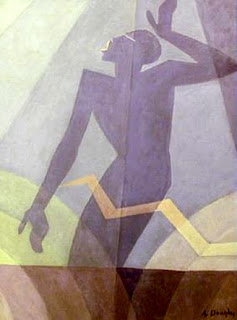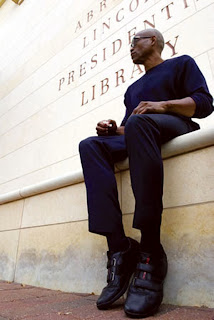African American Art: Harlem Renaissance, Civil Rights Era and Beyond
“African American Art: Harlem Renaissance, Civil Rights Era and Beyond” presents a selection of works by 43 black artists who lived through the tremendous changes of the 20th century. In paintings, sculpture, prints and photographs, the featured artists embrace themes both universal and specific to the African American experience, including the exploration of identity, the struggle for equality, the power of music and the beauties and hardships of life in rural and urban America.
“African American Art: Harlem Renaissance, Civil Rights Era and Beyond” is on view at the Smithsonian American Art Museum from April 27 through Sept. 3. The exhibition is organized by Virginia Mecklenburg, senior curator of painting and sculpture at the museum. It will travel to additional venues through 2014 following its presentation in Washington, D.C.
“This exhibition allows us to understand profound change through the eyes of artists,” said Elizabeth Broun, The Margaret and Terry Stent Director of the Smithsonian American Art Museum. “These works by African American artists are vital to understanding the complex American experience.”
The 100 works on view are drawn entirely from the Smithsonian American Art Museum’s rich collection of African American art, the largest and finest in the United States. More than half of the works featured are being exhibited by the museum for the first time, including paintings by Benny Andrews, Loïs Mailou Jones and Jacob Lawrence, as well as photographs by Roy DeCarava, Gordon Parks and Marilyn Nance. Ten of the artworks were acquired within the past five years. More than half of the objects in the exhibition are photographs from the museum’s permanent collection. Individual object labels connect the artworks with the artistic and social factors that shaped their creation.

Jacob Lawrence teaching school children at the Abraham Lincoln School. | The 20th century was a time of great change in America. Many of the social, political and cultural movements that came to define the era, such as the jazz age, the Harlem Renaissance and the civil rights movement, were rooted in African American communities. Black artists explored their identity in this quickly changing world through a variety of media and in styles as varied as postmodernism, documentary realism, expressionism and abstraction.
“Visitors will be struck not only by the power of these artworks, but also by the variety of the pieces on display,” said Mecklenburg. “So many new movements and styles grew out of the tumult of the 20th century, and these works reflect that diversity.” |
In paintings, prints and sculpture, artists such as William H. Johnson and Andrews speak to the dignity and resilience of those who work the land. Romare Bearden recasts Christian themes in terms of the black experience. Jones, Sargent Johnson and Melvin Edwards address African heritage, while Alma Thomas explores the beauty of the natural world through color and abstract forms.
Studio portraits by James VanDerZee document the rise of the black middle class in the 1920s,
while powerful black-and-white photographs by DeCarava, Nance, Parks, Robert McNeill, Roland Freeman and Tony Gleaton chronicle everyday life from the 1930s through the final decades of the 20th century.
“Each of the artists included in this exhibition made a compelling contribution to the artistic
landscape of 20th century America, and we are delighted to feature their work in the museum’s
galleries,” said Mecklenburg.
Educational Website
Oh Freedom! Teaching African American Civil Rights through American Art at the
Smithsonian is a new educational website that offers insights into the civil rights movement through the lens of Smithsonian collections. Drawing connections among art, history and social change, Oh Freedom! provides educators with tools to help students reimagine and reinterpret the long struggle for civil rights, justice and equality. Visit Oh Freedom! at africanamericanart.si.edu.
Online Features
Go behind the scenes with the museum’s conservators in the Smithsonian American Art
Museum’s blog, “Eye Level,” which will feature a monthly series on treatments performed in the
museum’s Lunder Conservation Center to ready objects for display in the exhibition. Posts on
Frederick Eversley’s “Untitled” (1974), Richard Hunt’s “Study for Richmond Cycle” (1977), Jones’ “Moon Masque” (1971), John Scott’s “Thornbush Blues Totem” (1990) and Renée Stout’s “The Colonel’s Cabinet” (1991-1994) will take readers inside the varied processes and techniques conservators use to prepare artworks for exhibition. Read the posts at eyelevel.si.edu.
Free Public Programs
Renée Ater, associate professor of art history at the University of Maryland, will explore the artistic motivation behind photographic works in the exhibition in a lecture titled “
Insight and Inspiration for 20th Century African American Art” Friday, April 27, at 7 p.m. in the museum’s McEvoy Auditorium.
A Juneteenth Family Day, June 16 from 11:30 a.m. to 3 p.m. in the museum’s Kogod Courtyard, includes historical reenactors, a reading of the Emancipation Proclamation, storytelling, live music by Follow the Drinking Gourd, craft making activities and a genealogical workshop. Pre-registration is required for the workshop only and is limited and on a first-come, first-serve basis via AmericanArtPrograms@si.edu or (202) 633-8490. This event is presented in conjunction with the Smithsonian’s National Portrait Gallery and the Smithsonian’s Anacostia Community Museum.
Three leading African American photographers—Tony Gleaton, Earlie Hudnall Jr. and Nance—will discuss their work Friday, June 22, at 7 p.m. in the McEvoy Auditorium. Debra Willis, professor of photography at New York University and author of Reflections in Black: A History of Black Photographers, 1840 to the Present, will act as moderator.
Mecklenburg will discuss the exhibition Wednesday, Aug. 1, at 7 p.m. in the museum’s McEvoy Auditorium. Marcia Battle, curator in the prints and drawings division at the Library of Congress, will highlight the works of selected featured artists in her talk Facing Forward Looking Back: Black Artists Search for Their Voice Tuesday, Aug. 14, at 6 p.m. in the exhibition galleries.
Publication
The exhibition is accompanied by an illustrated catalog, with an essay written by distinguished scholar Richard J. Powell, the John Spencer Bassett Professor of Art and Art History at Duke University. The book also includes entries about each artist by Mecklenburg; Theresa Slowik, chief of publications at the Smithsonian American Art Museum; and Battle. The catalog, co-published by the museum with Skira Rizzoli in New York, will be available for purchase ($60 hardcover, $40 softcover) in the museum store and at bookstores nationwide. The catalog also will be available for purchase in e-book form through the museum store. Visit the museum website for additional purchase locations.
National Tour
The exhibition will travel through 2014 to additional cities in the United States following its presentation in Washington, D.C. Confirmed venues include the Muscarelle Museum of Art at The College of William and Mary in Williamsburg, Va. (Sept. 28 – Jan. 6, 2013); the Mennello Museum of American Art in Orlando, Fla. (Feb. 1, 2013 – April 28, 2013); the Peabody Essex Museum in Salem, Mass. (June 1, 2013 – Sept. 2, 2013); the Hunter Museum of American Art in Chattanooga, Tenn. (Feb. 14, 2014 – May 25, 2014); and the Crocker Art Museum in Sacramento, Calif. (June 28, 2014 – Sept. 21, 2014). Information about additional venues will be available on the museum’s website.
Credit
“African American Art: Harlem Renaissance, Civil Rights Era and Beyond” is organized by the Smithsonian American Art Museum with support from Alston & Bird; Amherst Holdings LLC; Diane and Norman Bernstein Foundation; Larry Irving and Leslie Wiley; the William R. Kenan Jr. Endowment Fund; Clarence Otis and Jacqui Bradley; and Pepco. The C.F. Foundation in Atlanta supports the museum’s traveling exhibition program, “Treasures to Go.”
About the Smithsonian American Art Museum
The Smithsonian American Art Museum celebrates the vision and creativity of Americans with artworks in all media spanning more than three centuries. Its National Historic Landmark building is located at Eighth and F streets N.W., above the Gallery Place/Chinatown Metrorail station. Museum hours are 11:30 a.m. to 7 p.m. daily. Admission is free. Follow the museum on Twitter, Facebook, Flickr, ArtBabble, iTunes and YouTube. Museum information (recorded): (202) 633-7970. Smithsonian Information: (202) 633-1000. Website: americanart.si.edu.
# # #
SI-168-2012 - SMITHSONIAN INSTITUTION MRC 970 PO Box 37012 Washington DC 20013-7012 Telephone 202.633.8530 Fax 202.633.8535
Media only: Laura Baptiste (202) 633-8494 Courtney Rothbard (202) 633-8496 Media website: americanart.si.edu/pr Media preview: Thursday, April 26; 11 a.m. to 1 p.m.
FULL TEXT in PDF FORMAT
Exhibition about African American Art in the 20th Century Opens April 27 at the Smithsonian American Art MuseumIMAGE CREDIT:
U.S. National Archives and Records Administration
































